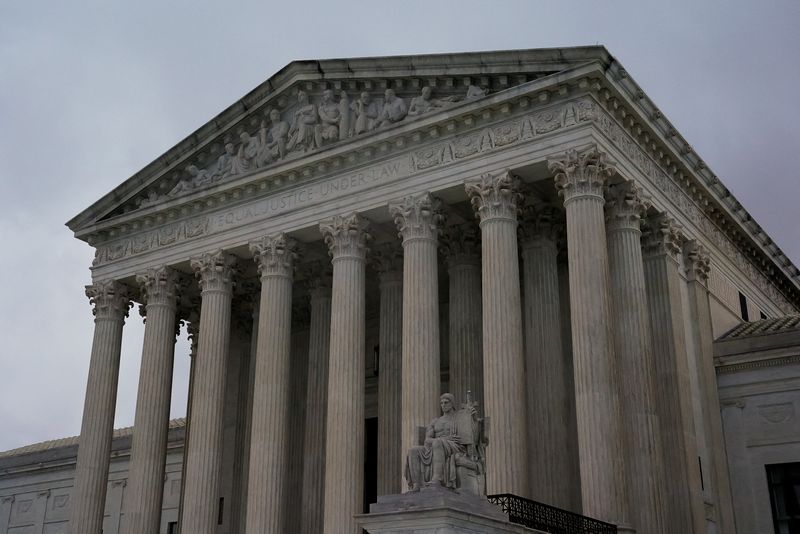[ad_1]
By John Kruzel
WASHINGTON (Reuters) – The U.S. Supreme Courtroom’s conservative majority on Monday appeared sympathetic to Alabama officers who defended a legislation that allowed police to grab and impound vehicles after drug arrests regardless of the house owners having no direct ties to the alleged crime.
The case argued earlier than the justices exams the ability of legislation enforcement to retain property seized by police that belongs to folks not charged with a criminal offense.
The Supreme Courtroom heard appeals by two ladies of decrease court docket rulings rejecting their claims that the federal government’s failure to supply a immediate court docket listening to to allow them to attempt to reclaim their property violated the Structure’s 14th Modification promise that authorities not “deprive any particular person of life, liberty or property with out due technique of legislation.”
Lena Sutton’s automobile was seized whereas it was being pushed by a good friend who borrowed it and was arrested for methamphetamine possession. Halima Culley’s automobile was seized when her college-aged son was arrested for marijuana possession whereas driving it.
Regardless of pleas to legislation enforcement to return their property, Sutton needed to wait 14 months and Culley 20 months earlier than courts decided their vehicles needs to be returned. They individually filed class-action lawsuits in federal court docket in search of cash damages towards Alabama officers and the cities of Satsuma and Leesburg, the place the arrests occurred.
The Supreme Courtroom has a 6-3 conservative majority. A number of the conservative justices signaled that they view Alabama’s present authorized course of as sufficient and urged that property house owners might jumpstart the method by promptly asking courts to problem what known as a abstract judgment of their favor or rule on an expedited foundation.
“Should you had filed a movement for abstract judgment every week after the property had been taken, or the method had begun – forfeiture proceedings started – would you be right here?” conservative Justice Clarence Thomas requested a lawyer for the plaintiffs.
Civil forfeiture legal guidelines allow the federal and state governments to grab and infrequently completely maintain autos, actual property and different property alleged to have been used to hold out or facilitate a criminal offense – even when the proprietor has not been convicted and even charged with a felony offense.
Liberal justice Sonia Sotomayor railed towards what she known as “abuses of the forfeiture system.”
“It has been documented all through the nation repeatedly of the incentives that police are given to grab property to maintain its worth,” Sotomayor stated. “We additionally know that that incentive has usually led to months, if not years, of retention of property.”
Some states require authorities officers to promptly present that seized property is probably going concerned in criminal activity and, failing that, return the property whereas court docket proceedings over the proprietor’s final proper to the property play out.
For the reason that fits have been filed, Alabama has revised the civil forfeiture legislation at problem to let somebody who claims to be an harmless proprietor request a listening to at any time after the property seizure.
Alabama had been among the many U.S. states that didn’t mandate a immediate pretrial “retention listening to” wherein the federal government should justify the property seizure. At problem in Monday’s arguments was whether or not these immediate alternatives for house owners to reclaim their property are essential to satisfy constitutional due course of necessities.
Conservative Chief Justice John Roberts requested if making retention hearings necessary runs the chance of “compromising” a choose’s ultimate ruling on whether or not an proprietor’s property needs to be returned or forfeited as a result of its hyperlink to crime, pointing to “such basic items as preservation of the property itself.”
Federal judges dominated towards the plaintiffs of their lawsuits and the Atlanta-based eleventh U.S. Circuit Courtroom of Appeals affirmed these selections. President Joe Biden’s administration sided with Alabama within the case.
(Reporting by John Kruzel and extra reporting by Andrew Chung in New York; Modifying by Will Dunham)









